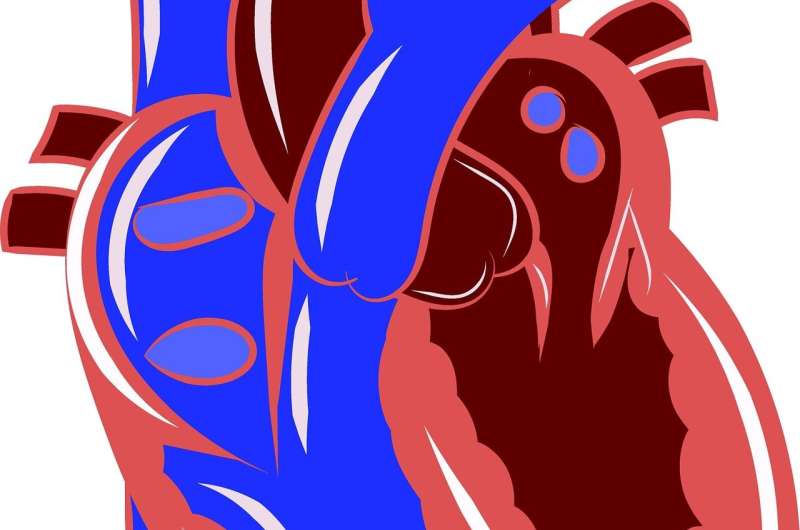Credit: Pixabay/CC0 Public Domain
A growing body of evidence indicates that some people thought to have an allergic response to injectable penicillin, the standard treatment for rheumatic heart disease, may instead be experiencing a cardiac reaction to the medicine, according to a new American Heart Association presidential advisory published today in Journal of the American Heart Association. The advisory, which represents official insights from the American Heart Association, suggests oral penicillin may be a safer option for people with rheumatic heart disease who are at high risk of a cardiac reaction.
More than 39 million people worldwide have rheumatic heart disease (RHD), a condition in which the heart's valves are permanently damaged by rheumatic fever, which can occur if a strep throat infection or scarlet fever are untreated or inadequately treated. Most RHD cases are among people living in low- and middle-income countries, where RHD is often diagnosed after severe valvular heart disease or other cardiovascular complications have already developed, leading to higher rates of death and lower life expectancy.
The recommended treatment for RHD is an intramuscular injection of benzathine penicillin G (BPG) given every three to four weeks for a prolonged period of time (e.g., 10 years, up to the age of 40 years or lifelong). Treatment with BPG for RHD has been limited in part due to patients' and clinicians' fears of a severe allergic reaction called anaphylaxis, even though the risk of anaphylaxis following BPG injection is low.
"Until recently, deaths within the minutes and hours after BPG injection have been assumed to be due to anaphylaxis," said Chair of the presidential advisory writing group Amy E. Sanyahumbi, M.D., pediatric cardiologist at Texas Children's Hospital and Assistant Professor of Pediatrics at Baylor College of Medicine. "However, a growing number of reports of BPG-related deaths did not have the features of classic anaphylaxis, and, instead, point to cardiovascular reactions. This distinction is important, as it indicates the need for different strategies to prevent or stop these reactions to BPG."
Signs of a cardiovascular response often occur immediately after administration of BPG, sometimes even during injection. They include low blood pressure, which may be corrected by changing physical position, slow heart rate and fainting, all of which may lead to low blood flow to the heart, irregular heart rhythm and sudden cardiac death. On the other hand, signs of anaphylaxis after BPG injection are usually slightly delayed after the injection, even up to an hour later, and include coughing, respiratory distress, rapid heart rate, low blood pressure that doesn't respond to position change, fainting, itching and redness at the injection site.
The risks of a cardiovascular reaction to BPG are highest among individuals with severe mitral stenosis, aortic stenosis, aortic insufficiency or decreased left ventricular systolic function (ejection fraction < 50 percent), and those who have active symptoms of RHD.
The advisory suggests that people who are at low risk of cardiovascular reaction and who do not have a history of being allergic to penicillin or anaphylaxis be prescribed BPG for treatment and prevention of RHD. BPG has proven to be the best treatment for prevention of recurrent rheumatic fever. For people with higher cardiovascular risks such as severe valvular heart disease or heart failure, treatment with oral penicillin should be strongly considered.
For all patients receiving BPG, the following standard practices are advised:
- Reducing injection pain and patient anxiety, both of which are known risk factors for injection-related fainting. Methods for pain reduction include applying firm pressure to the site for 10 seconds or application of an ice pack or the use of analgesics (such as acetaminophen, ibuprofen or other non-steroidal anti-inflammatory medications (NSAIDs).
- Patients should be well-hydrated prior to injection. Drinking at least 500 ml of water before injection has been found to prevent reflexive fainting.
- Eating a small amount of solid food within the hour before injection.
- Receiving the injection while laying down, which may reduce the risk of blood pooling in the extremities.
- Providers who administer BPG should be taught how to recognize and quickly treat symptoms such as low blood pressure, low heart rate or fainting.
"This advisory is urgently needed to raise awareness, provide risk stratification and guide health care professionals on easily implementable protocols to reduce risk and overcome reluctance to administer and receive BPG treatment for rheumatic heart disease," said Andrea Z. Beaton, M.D., vice-chair of the advisory writing group, a pediatric cardiologist at Cincinnati Children's Hospital and associate professor of pediatrics at the University of Cincinnati School of Medicine.
More information: Penicillin Reactions in Patients With Severe Rheumatic Heart Disease: A Presidential Advisory From the American Heart Association, Journal of the American Heart Association (2021). DOI: 10.1161/JAHA.121.024517
Journal information: Journal of the American Heart Association
Provided by American Heart Association
























